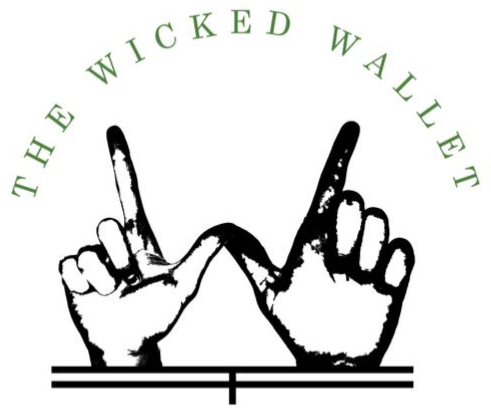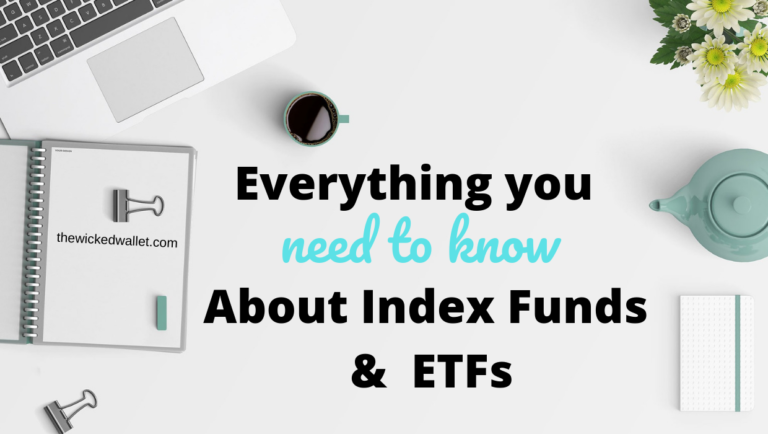In the Financial Independence Retire Early Community (FIRE), we often hear people recommending investing solely in index funds because of their low cost, simplicity and diversification. While I too believe that index fund investing is a great foundation to build your investment portfolio on, I would like to offer up a second option for those who don’t have the minimum contribution needed for index funds… exchange traded funds or ETFs.
Listed below are brief descriptions of both index funds and ETFs, pros and cons of each and also why investing in either an Index Fund or ETF is a dominant strategy. If you have had success investing in Index Funds or ETFs, let me know if the comments!
Index Funds
An Index fund is a kind of mutual fund that is designed to track a benchmark. The benchmark can be a variety of things from an industry’s performance to a specific stock market’s performance. So, whereas a mutual funds goal is high performance (at a high cost), an index funds goal is to keep pace with an index.
There are wide variety of index funds that are offered for any type of investor. The most common index fund you will hear about in the FIRE community is VTSAX, which is a total market fund at Vanguard (ETF equivalent is VTI).
With most index funds, there is a minimum contribution to even invest in these funds. Currently for Vanguard you need at least $3,000 to invest in most of their index fund options, some even require a larger sum.
These funds are buckets filled with individual stocks and bonds. The stocks and bonds within it are decided based upon the specific index it is representing.
Index funds are a passive investment, managed by professionals. Those managing these funds are trying to match the performance of the given benchmark and not constantly churning whats inside the fund to make for a potentially higher return.
Since these funds are not actively managed, they operate at a much lower expense ratio. An expense ratio is the percent of the fund that is used to pay for costs like management.
Since these are a type of mutual fund, the price of the index fund is not updated in real time. Instead it is updated at close of the trading day. This makes index funds less liquid due to the fact that you cannot trade within the day.
Index funds let you set up automatic investments and withdrawals. Also, they allow dividends to be automatically reinvested.
Index funds are still better than stock picking for tax purposes however they are less optimal than ETFs for this specific reason. When you have to sell out of your index fund, you are selling your shares of the index fund back to the fund itself. The index fund needs money to buy those shares from you, so it sells stocks from its portfolio. Therefore, an index fund is constantly selling and buying shares of stock whenever investors join or leave the fund. This means that you are not only being taxed for when your selling your shares of the fund but you’re also being taxed since the fund is selling stock which is a taxable event (all shareholders have to pay taxes on this).
Index Fund Pros
- Wide variety available
- Low Expense Ratio
- Dividends can be automatically reinvested
- Can set up automatic contributions or withdrawals
Index Fund Cons
- Minimum contribution can be in the thousands
- Less liquid than other investments (ETFs specifically)
- Less tax optimal
The most common places to buy index funds include Vanguard, Fidelity and Charles Schwab.
ETFS
Think of an ETF as an individual share of an index fund. So just like an index fund you are buying a bucket of investments, however, instead of needing a couple thousand as a minimum investment, all you need to buy an ETF is enough to cover a single share (and commission cost if there is one).
ETFs are traded like stocks, so you can buy and sell ETFs during the trading day.Therefore, the price of an ETF is constantly updating and changing.
Since ETFs are traded like stocks, you can choose different order types when submitting your order which may help give you a better control of the price. That being said, a market order is still the easiest option and probably your best bet in most cases.
Again, since they are treated similar to stocks, ETFs have commissions or trading fees whenever you need to buy/sell. Some custodians wave the fees if you buy their funds.
VTI is the ETF equivalent of the most popular Index Fund VTSAX, both total market funds. Both have a very low expense ratio of 4%.
ETFs do not allow you to make automatic withdrawals or investments. Unlike an index fund, you cannot automatically reinvest any dividends from an ETF.
Taxation in regards to an ETF is a bit simpler than an index fund. With an ETF, you sell your position on the market, you are not reselling them back to the fund. Therefore, the fund does not have to liquidate positions to come up with capital to buy back your shares. Which means less taxes for you, only having to pay once on any money made by selling your shares.
ETF Pros
- Lower barrier of entry for buying ETFs (compared to index funds)
- Greater control over price (order types)
- Low expense ratio
- Optimal taxation
- Liquid (able to trade during the day)
ETF Cons
- Dividends cannot be automatically reinvested
- Cannot automatically set up investments or withdrawals
- Liquid (temptation to trade often)
Note: Liquidity was listed as both a pro and a con. It can be beneficial when necessary however this could hinder an individuals investment strategy if they are always tempted to trade positions.
Some of the most common places to buy ETFs include Vanguard, Fidelity and Charles Schwab.
Why Index Funds & ETFs?
If you want to invest on your own without an advisor and get the most out of your money, it might be wise to invest in either or both options. The costs are low, they are simple to invest in and they have very stable returns its a no-brainer.
SInce both are buckets consisting of a variety of stocks and bonds, they are therefore innately diversified. Adding either to your portfolio well help to diversify your assets which is a big win!
Both are passive investments.This means that they are not being managed actively. Also, since these are structured to track an index or benchmark, they are not trying to outperform the market. This means that there is less risk of the manager making a mistake because both are made up of specific aggregates of their specific index.
Again, since they are passively managed, they have much lower expense ratios than an actively managed fund. This means more of your money stays in your pocket.
Both index funds and ETFs are more tax efficient in comparison to active investing. Be sure to invest through a tax advantages account like an IRA or 401k to fully optimize your tax strategy.
Check out this article on the best retirement accounts. It lays out examples of tax advantaged accounts.
Final Thoughts
Both index funds and ETFs are great investment opportunities. They both will help diversify your portfolio and increase the likelihood of stable returns. Based upon the pros and cons listed above, what do you think is the best investment for you? ETFs or Index funds?



